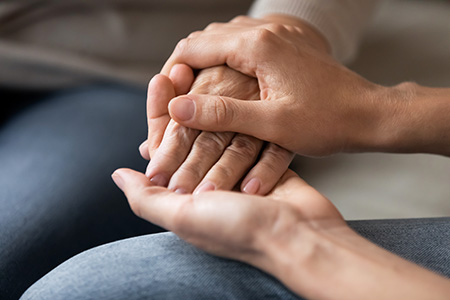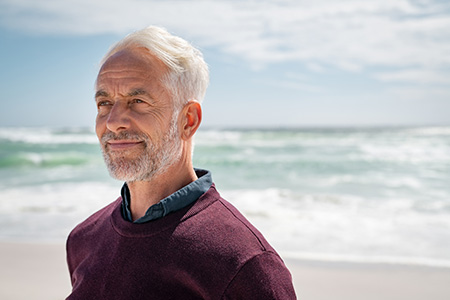When my neighbor John recently lost his wife, my heart ached for him. I couldn’t imagine the pain he was going through, especially since he’d been in the habit of coming home to her every day and sharing their day together. They always got together at 5 p.m., and they made happy hour their special time to be together to savor and enjoy a well-crafted cocktail. It was a ritualistic tradition that John and Marion developed over many years, and I could only guess that he was struggling to cope with that loss.

My empathy soon kicked in and it wasn’t long before I had started a weekly happy hour for the two of us to catch up. It’s become a weekly ritual that’s paved the way for a meaningful friendship. We talk about our week, share what’s new, and bond over our experiences. But make no mistake; I’m the one who’s learning life lessons and growing more than I could have ever imagined. John has truly humbled me. All the while, his wife’s picture is never too far on the mantel, which makes it feel like she’s watching over us. In all honesty, I look forward to this get-together every week. It’s also showed me that when someone in your circle experiences loneliness, there’s almost always something you can do about it.
As human beings, we’re hard-wired for connection. However, the Covid-19 pandemic has prompted stay-at-home orders that have kept many folks isolated from the people they love. That doesn’t change the fact that it’s simply human nature to seek a sense of belonging and attachment to others. It may be part of the reason why a common end-of-life regret for many people is wishing they’d maintained better relationships with friends.
Belonging to an active social circle goes hand in hand with empathy; two things that can directly impact your health and quality of life. The ripple effect is often far-reaching as your physical and emotional well-being are closely tied to your financial decision-making. It can be difficult to think clearly and make progress on long-term financial goals if you’re feeling chronically down and lonely. Social support and rich personal relationships can help stave off such feelings.
Now is as good a time as any to reflect on these things while looking ahead and making new goals for the future. Staying socially active and dialing into empathy can only help in that endeavor.
Three Questions to Help Prevent Loneliness
My experience with John highlights the value of building lasting relationships, which are particularly important for folks heading into retirement. If you’re in this camp, consider the following three questions posed by the MIT AgeLab. They each speak directly to the importance of maintaining strong social ties as we age. Working with my clients year after year, I’ve seen firsthand just how powerful they are.
- Who will change my lightbulbs? Will you be prepared to maintain your home and keep up with routine repairs as you age? Being cut off socially can make it much harder to truly live independently.
- How will I get an ice cream cone? Will consistent and adequate transportation be available to you in retirement? To put it another way, how easy will it be for you to pick up and go do things that bring you joy? This includes grabbing ice cream on a whim or meeting up with friends for coffee.
- Who will I have lunch with? Meaningful social bonds are ones that encourage you to live a healthy and active lifestyle. As you age, it’s important to think about who you’ll be able to call on for everything from lunch dates to daily walks.
These may sound like simple questions, but they’re also powerful retirement planning tools that reinforce the value of social connection and empathy as we age.
Loneliness Tends to Affect Overall Quality of Life
To feel lonely is to feel deprived of social connections, and it usually isn’t something that stands alone. Instead, it tends to color your overall outlook on life, bleeding into your experiences and touching other aspects of your well-being. These concerns feel all too real as the world continues to navigate a global pandemic—especially among vulnerable older communities. Many have spent the better part of a year (and counting) away from their loved ones.
Being away from family and friends can feel crushing. What’s more, research has shown that when compared to people with strong personal networks, those who feel lonely or isolated are at higher risk for stroke or heart attack. It stands to reason that loneliness can take a real and lasting toll on healthy aging—an important detail to keep in mind when planning for the future. On top of that, chronic loneliness can also impair your perspective and hinder your ability to take action toward achieving your financial goals.
With that said, it’s also important to remember that money isn’t everything in life. All the riches in the world are worthless if we don’t also have meaningful relationships. That’s not to say that financial planning isn’t crucial—it absolutely is and can help you live a life that’s aligned with your values. However, it’s equally important not to lose sight of human connection and emotional well-being. Those who do will likely find it harder to manifest their lifelong dreams.
Engineering Your Vision and Bringing it to Life
Take the time to look inward and examine your relationships and overarching quality of life. This includes reflecting on the past to help you identify new goals going forward. Maybe you’ve discovered a new career direction or a desire to retire abroad once the pandemic is safely behind us. Others may feel compelled to reconnect with old friends or make a more concerted effort to make new friendships.
Whatever your goals, incorporating consistent social support can help you live a more compassionate life. And when empathy comes together with rich social bonds, you’re in a stronger position to achieve your goals.
At JJ Burns & Company, we embrace a holistic, 360-degree approach to financial planning that takes all of this into account. We care about what matters to you most and want to help you make a plan to reach your lifelong goals. Reach out to us today to fine-tune your game plan.




